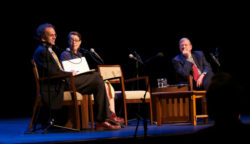UCSB Arts & Lectures and the Interdisciplinary Humanities Center hosted “Drone Warfare: Prospects and Dangers” at Campbell Hall on Wednesday, opening the way for discussion of the United States’ use of militarized drones.
Renowned journalist Jeff Greenfield, who has written for major publications such as the New York Times and TIME magazine, moderated the discussion, which included the input of authors David Cole, Mary Ellen O’Connell and Avery Plaw. The event centered on the legality and ethicality of using drone strikes as a means to execute United States policy, and it featured a short speech by each speaker, followed by roughly an hour of debate and a 20-minute Q&A session with the audience. The event is the final installment in this year’s IHC series, “Fallout: the Aftermath of War.”
The debate featured associate professor of political science at the University of Massachusetts at Dartmouth, Avery Plaw, who said while drone strikes are preferable to military alternatives, he does not endorse President Obama’s drone policy of targeting some low priority militants.
“I will advance a firm defense of drone strikes against specifically key leadership targets and experts on the following four grounds: their tactical effectiveness, their strategic impact [and] their ethics, and I’ll even venture into the difficult area of legality,” Plaw said.
Cole, who is a professor at Georgetown University Law Center, legal correspondent for The Nation and regular contributor to the New York Review of Books, said that while there is nothing inherently wrong with drone strikes, Obama’s drone policy should be opposed since it lacks transparency.
“To me, the most problematic aspect of the drone program, thus far, is its secrecy,” Cole said. “What we know is the president has the power to kill people without trial, without a hearing, without notice [and] in secret. We don’t even know the terms under which the president is exercising this remarkable power.”
O’Connell, University of Notre Dame professor of international dispute resolution, said she stands against drone strikes primarily for legal and ethical reasons.
“This killing is unlawful. It is counterproductive to the successful suppression of terrorist groups over time, and killing of this kind meets neither our effectiveness nor our legal standards,” O’Connell said. “It is in conflict with our most fundamental moral principles.”
UCSB 2012 alum Eric Hvidsten said dialogue, such as the debate that took place Wednesday, plays an important role in shaping future policy, and he said students have a significant voice in determining national policy in the future.
“I think public debate, raising public consciousness about the issues and having an intelligent conversation about them are going to play a large part in affecting policy on a national scale,” Hvidsten said. “It’s only a matter of time before a number of nations have drones, and they’re going to look toward the U.S. for precedent.”
First-year biology major Jason Gilbert said the debate is also useful for attendees who have not taken a side to the issue in regards to the importance of individuals seeking to be well-informed on such political issues.
“I don’t have strong opinions at all, which is why I’m coming here. I want to see both sides of the debate,” Gilbert said. “There are definitely pros and cons of both sides. I guess they do, in theory, save American lives by not having us overseas and having other eyes out there, but civilian casualties can’t be taken lightly.”















